China Arts & Entertainment
The Early Days of Rock in China – Interview with Sinologist & Hardrocker Jeroen den Hengst
From copied tapes to a unique rock scene – Jeroen den Hengst was part of the Beijing rock scene when it first awakened.
Published
8 years agoon

Dutch Sinologist and musician Jeroen den Hengst was part of the Beijing rock scene when it awakened in the late 1980s. Nearly three decades later, Den Hengst looks back on the early days of rock in China – before, during and after the Tiananmen protests – and talks about the music scene in Beijing and his personal path from young Sinologist to serious hardrocker.
When I notice some glitters sparkling on Den Hengst’s face as I meet him in downtown Amsterdam in early Spring, he nonchalantly brushes them off. He was performing the night before, he tells me.
Den Hengst is the host and guitar player of Amsterdam’s Hardrock Karaoke, which has become quite a phenomenon in Amsterdam and beyond. We sit down, order a beer and talk about Den Hengst’s musical journey that started in the early days of China rock.
FIRST STEPS ON THE MAINLAND
“There was simply no access to pop music. I had brought forty cassette tapes with music to China; they were copied hundreds of times.”

“I arrived in China in September 1987 when the famous Beijing musician Cui Jian (崔健) was just getting big. I came to China to study at Peking University as part of my Sinology studies at Leiden University, but soon ended up more in the Beijing music scene than I was in class,” Den Hengst tells:
“I never used to be a really good student – music was always my true passion. I had also played in bands throughout high school. But I was very interested in China. I had to learn its history for my final high school exams. The language intrigued me. So I started studying it at university and had already finished my third year when I arrived in Beijing. I soon discovered I couldn’t even properly order food, despite studying the language. It was my first time in China.”
“Singer Cui Jian got together at the time with Eddy [Randriamampionona] from Madagascar and drummer Zhang [Yongguang]. They would perform in Ritan Park with their band Ado. I would go there, and found out that there were quite some young people making music.”
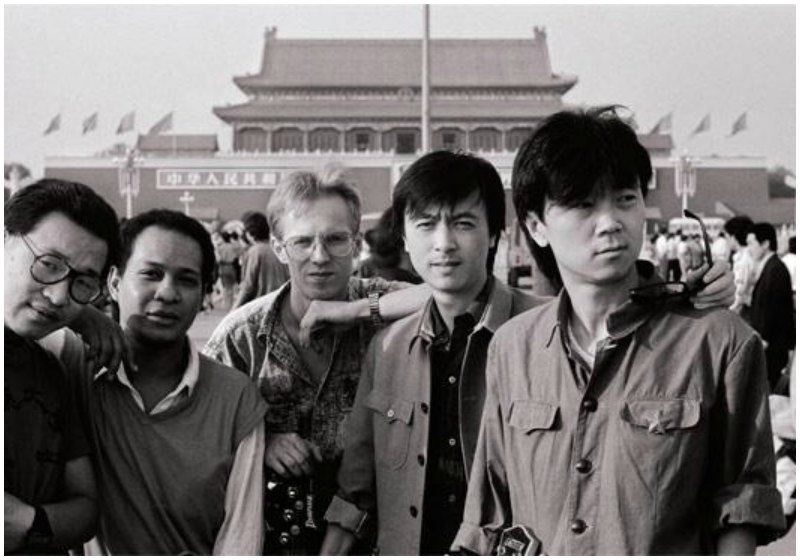
THE ADO BAND IN 1989 WITH FROM LEFT TO RIGHT SANR (DRUMS), EDDIE FROM MADAGASCAR (GUITAR), BALASZ FROM HUNGARY (BASS), LIU YUANR (SAX) AND FRONTMAN CUI JIAN (IMAGE FROM REDIANWANG)
“Zang Tianshuo (臧天朔) would also play there, and I became acquainted with Chinese rock musician He Yong (何勇), who later became well-known with his album Garbage Dump (垃圾场). I knew all of them, it was just a small bunch of people in that scene. Especially the foreigners in Beijing knew each other at the time – there were not that many, and if there was something happening we just knew it through word of mouth.”
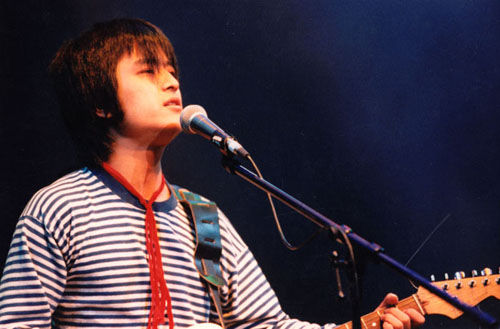 Singer He Yong in early 1990s (Xinhua).
Singer He Yong in early 1990s (Xinhua).
“I started frequenting these sort of performances and would join on stage every now and then, as I did with the band Mayday (五月天), in which He Yong also played. They had all just started playing and had zero background knowledge in pop music as there was simply no access to that kind of music. I had brought forty cassette tapes with me to China; they were copied hundreds of times. Before I knew it I was hanging out with these guys days on end, recording songs in the studio. They would also make cassette tapes with Toto music, for which I would do the singing. I would get 500 kuai [±80$] for it, which got me through another month. I lived on the campus anyway, and did not need much to get by.”
“I’ve always felt very welcome, and our interest was mutual. I wanted to play music with them, and they needed a guitar player. The fact that I was foreign didn’t matter – we were all equals. I stopped going to Chinese classes at university, but in the meantime, my Chinese was improving every day because I was talking to my new friends. I once went back to class in the second semester and discovered I was ahead of the others. By then I couldn’t just properly order food – I was talking Chinese the whole time.”
THE EARLY DAYS OF ROCK IN CHINA
“The years from 1986-1989 were the blossoming days for rock music – those were the days of liberation.”
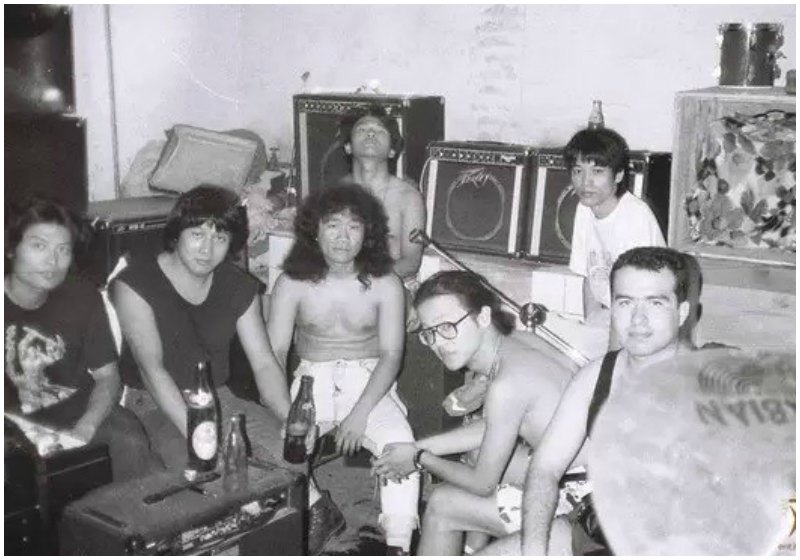 Heibao band members (Zhihu).
Heibao band members (Zhihu).
“The years from 1986-1989 were the blossoming days for a new type of music in China, but it was more than that: those were the days of liberation. Everybody thought: we’re opening up, we’re becoming modern. It was the build-up to the student movement of ’89. Rock music was a big part of it.”
“The late ‘80s were not necessarily the beginning of pop music in China, as you also had music by Chinese pop queen Teresa Teng and others which was popular before that time. But the rock scene provided a different sound – it was not as sweet as Teresa Teng, and it was influenced by the cassettes that were passed around, which included sounds by Toto, The Police, Bob Marley, and other artists. The difference between pop and rock is lifestyle; it was no music for the millions, it was a hip and alternative scene.”
“The ‘rock scene’ maybe consisted of 30 to 40 people. Cui Jian played an important role in those early days of rock. For many young adults, he was that critical voice against the authorities. He was very good with language, and also used Chinese instruments in his music. He really knew how to do it. Nobody ever surpassed him in that way.”
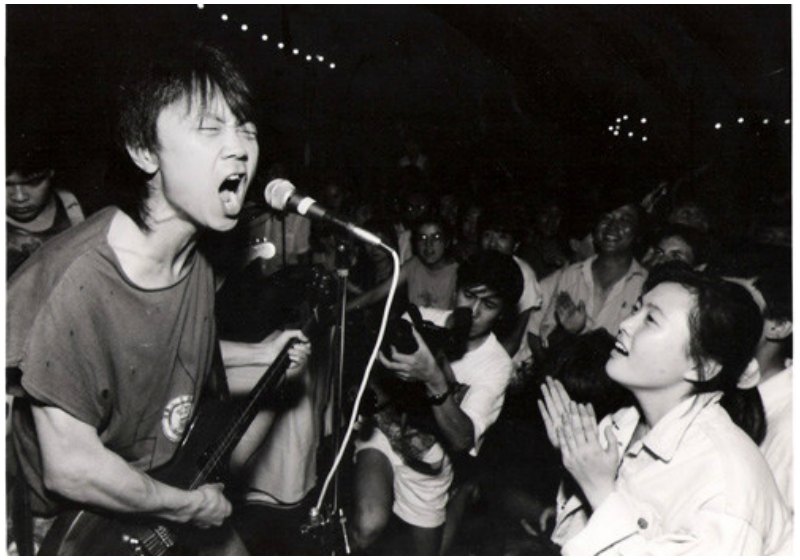 Cui Jian in 1990.
Cui Jian in 1990.
“Many musicians of those days were part of danwei’s [work units] focused on dance and music. Most of them were able to play a traditional Chinese instrument. They all came from a musical environment, but their power was to give those Chinese musical influences a new twist and combine them with the music that came in via Europe or America. In the music from those days, you can clearly hear what they listened to. Part of it is coincidence; Cui Jian sometimes only sounds like The Police because that was the cassette tape that happened to be available to him, while others weren’t.”
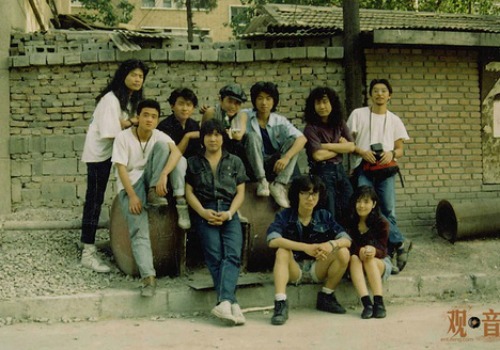 The Heibao band 黑豹乐队 (image from my.isself).
The Heibao band 黑豹乐队 (image from my.isself).
“Heibao (黑豹乐队, Black Panther) was a band that was also formed at the time. They later became the best-selling mainland Chinese rock band ever. More people started engaging with the rock scene. The simple core value in the beginning was that everyone just wanted to make music. Those were the free days. We would hang out together in the studio and if we went out we would hop on our bikes and cycle through the city. The streets were pretty empty. Looking back, I mainly remember that feeling of freedom and spontaneity. ”
THE TIANANMEN MOVEMENT
“The army had taken over the city. There was no more music, no more nothing.”
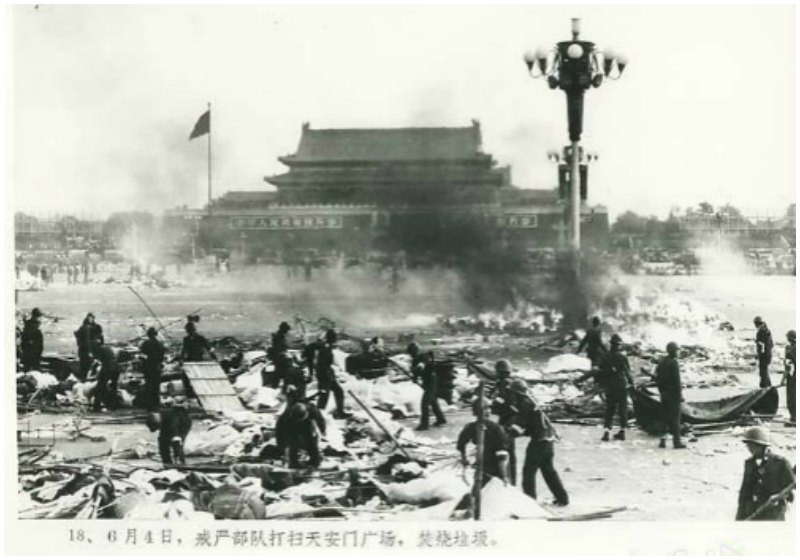 The aftermath: cleaning up Tiananmen Square, June 1989.
The aftermath: cleaning up Tiananmen Square, June 1989.
“I lived in Beijing throughout 1987-1988 and then went back in 1989. The liberal politician Hu Yaobang died in April 1989 and everyone mourned his death because he was a reformer who inspired people – he was, amongst others, against corruption. He was very popular amongst Chinese students. University students in Beijing went through the city in a procession to honour him and then the slogans started coming against corruption. It became political very quickly.”
“I arrived again in Beijing with a crew on the day Hu Yaobang died to make a documentary about youth culture in China for Dutch television and we recorded everything. For us, it was a coincidence that we arrived exactly at that moment, and we saw more and more international press arriving while we were filming all along. We only later realised how big this event actually was. It was one big roller coaster.”
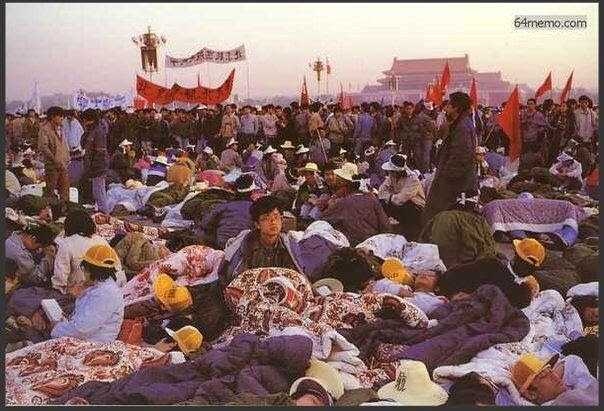 Picture of Tiananmen square protests, 15 May 1989 (source).
Picture of Tiananmen square protests, 15 May 1989 (source).
“We were staying at the Peking University campus, and saw more and more trucks coming and going with students hopping on to go to Tiananmen Square. If I had to compare it with anything, I’d say it was like Woodstock – a bizarre hopeful and loving vibe was capturing Beijing. I absolutely loved it, and I was one of the hundred-thousands of people standing on Tiananmen. We would go there all the time, also in the middle of night, and all my friends from the music scene would also be there to provide entertainment to the students who stayed there.”
“Cui Jian’s Tiananmen performance was legendary. His songs also made sense, singing about ‘I’ve got nothing to my name’ [see song translation]; he voiced the feelings many had the time. But there were a lot more people there who made music, there were many from the art and music scene. Students were even setting up a Statue of Liberty on Tiananmen. It was one big party.”
“At a certain point I realized that things were going the wrong way; things started to get dirty, literally, and I was too caught up – although I wasn’t politically involved at all. It was just that there were many cute girls and it was all so rock ’n roll, and I enjoyed it, but I got it all wrong. People started getting tired and not much was really happening. The height of the moment was gone. The same familiar faces were appearing in the media and the atmosphere changed. We decided to go to Shanghai by the end of May to further work on our documentary there.”
 (Image by New York Times.)
(Image by New York Times.)
“It was night in Shanghai, on June 4th, when there was a quiet procession throughout Nanjing Avenue with people carrying big posters. On the trees we saw stapled faxes with images that had gotten through via Hong Kong about what had happened in Beijing. We saw dead people and burnt soldiers. I almost couldn’t believe it – that such a peaceful and care-free time had turned into such a dark thing. We did not return to Beijing afterwards, as we had nothing to do there anymore. People from the Dutch embassy in Beijing went to the campus to collect our photos and films to make sure they were safe. The army had taken over the city. There was no more music, no more nothing.”
“In those last months of 1989 and in the early nineties I went back to Beijing, but things had changed a lot – especially in the music scene. There were a lot of wild parties, but everything had become more underground. Many musicians endured hard times during those days.”
AFTER THE EIGHTIES
“Many of the guys from those days have gone mad.”
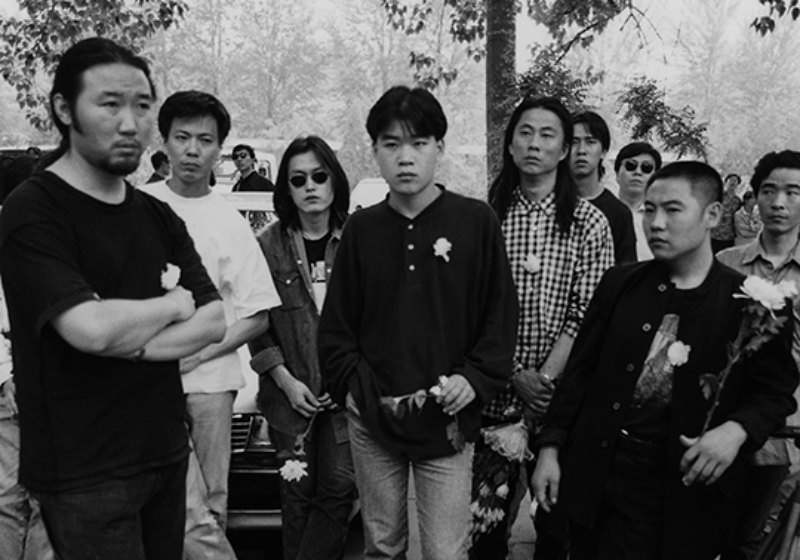 Beijing musicians at funeral of bassist Zhang Ju of band Tang Dynasty (founded by Kaiser Kuo with Ding Wu and Zhang Ju in 1988). Zhang died in a motorcycle accident in 1995. From left: Zhang Ling (Mayday), Zhu Jia, Zhou Ren (Xiutie/Pork), Jin Hai, Li Ji (Budaoweng) and Li Jie. Photo by Gao Yuan).
Beijing musicians at funeral of bassist Zhang Ju of band Tang Dynasty (founded by Kaiser Kuo with Ding Wu and Zhang Ju in 1988). Zhang died in a motorcycle accident in 1995. From left: Zhang Ling (Mayday), Zhu Jia, Zhou Ren (Xiutie/Pork), Jin Hai, Li Ji (Budaoweng) and Li Jie. Photo by Gao Yuan).
“People living in a dictatorship develop techniques to know the margins within which they can operate. In the early nineties, I noticed that the guys in the music scene somehow always knew when their friends were getting out of prison. Or when they could organise a party. It was also the time when Ecstacy came up – it was called yáotóuwán (摇头丸) in Chinese, literally: ‘shake-head-pill’, ’cause it made their heads shake.”
“It seems like not many people were able to pick up the music vibe where it had left off before those dark days in 1989. Some just couldn’t get on with the changing times, others were on drugs. Not many were arrested, but there were a lot of them who had to lay low for a long time after 1989. Zhang [Ado drummer] committed suicide last year. He Yong is now either imprisoned or in a mental hospital. Many of the guys from those days have gone mad or suffered a severe setback after their moment in those early flourishing days of rock had passed.”
“Now the music scene seems to be somewhat blooming again. Beijing really has got some good bands. Shanghai has got a nice jazz scene. But there is no solid base for these bands to build on. Japan and Korea are far ahead of China when it comes to the music scene. In China’s music scene, people are more individualistic – they are staring at the ground when you want to find the groove together. If everyone is only looking to do their own thing and don’t work together, you don’t get that music to the next level.”
“After living in China, I continued my own musical career in the Netherlands as a musician and producer. China never really influenced my career back home. But I did once produce a song in Chinese for Dutch singer Brigit Schuurman. I still go back to Beijing and get on stage every now and then. Last year I performed in Yugong Yishan together with Li Ji (Jige) from the band Budaoweng (不倒翁). I’m also working on recording a duet between Shanghai musician and friend Coco Zhao and my wife [Dutch singer Monique Klemann].”
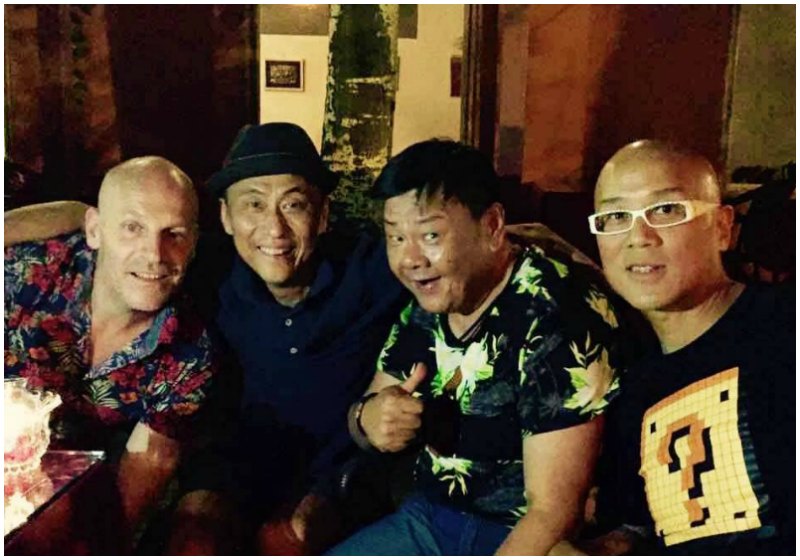 Den Hengst in Beijing in 2015 with good friend and fellow musician Li Ji (aka Jige) on his right and two Taiwan friends from the rock scene.
Den Hengst in Beijing in 2015 with good friend and fellow musician Li Ji (aka Jige) on his right and two Taiwan friends from the rock scene.
“I will go back again this Summer and I will perform again. Somehow I always get that same nostalgic feeling I had in the Spring of 1989 when I walk on the streets of Beijing – that feeling of freedom, that anything’s possible.”
 Den Hengst dressed in full attire for Hardrock Karaoke (left) and on the right during live performance. In the featured image, Den Hengst is performing at Yugong Yishan in 2015.
Den Hengst dressed in full attire for Hardrock Karaoke (left) and on the right during live performance. In the featured image, Den Hengst is performing at Yugong Yishan in 2015.
This interview was conducted and condensed by Manya Koetse in Amsterdam.
Follow @WhatsOnWeibo
©2016 Whatsonweibo. All rights reserved. Do not reproduce our content without permission – you can contact us at info@whatsonweibo.com.
Manya Koetse is the founder and editor-in-chief of whatsonweibo.com. She is a writer, public speaker, and researcher (Sinologist, MPhil) on social trends, digital developments, and new media in an ever-changing China, with a focus on Chinese society, pop culture, and gender issues. She shares her love for hotpot on hotpotambassador.com. Contact at manya@whatsonweibo.com, or follow on Twitter.

China Arts & Entertainment
“Old Bull Eating Young Grass”: 86-Year-Old Chinese Painter Fan Zeng Marries 36-Year-Old Xu Meng
Online reactions to the news of Fan’s marriage to Xu Meng, his fourth wife, reveal that the renowned artist is not particularly well-liked among Chinese netizens.
Published
23 hours agoon
April 18, 2024
The recent marriage announcement of the renowned Chinese calligrapher/painter Fan Zeng and Xu Meng, a Beijing TV presenter 50 years his junior, has sparked online discussions about the life and work of the esteemed Chinese artist. Some netizens think Fan lacks the integrity expected of a Chinese scholar-artist.
Recently, the marriage of a 86-year-old Chinese painter to his bride, who is half a century younger, has stirred conversations on Chinese social media.
The story revolves around renowned Chinese artist, calligrapher, and scholar Fan Zeng (范曾, 1938) and his new spouse, Xu Meng (徐萌, 1988). On April 10, Fan announced their marriage through an online post accompanied by a picture.
In the picture, Fan is seen working on his announcement in calligraphic form.

Fan Zeng announces his marriage on Chinese social media.
In his writing, Zeng shares that the passing of his late wife, three years ago, left him heartbroken, and a minor stroke also hindered his work. He expresses gratitude for Xu Meng’s care, which he says led to his physical and mental recovery. Zeng concludes by expressing hope for “everlasting harmony” in their marriage.
Fan Zeng is a calligrapher and poet, but he is primarily recognized as a contemporary master of traditional Chinese painting. Growing up in a well-known literary family, his journey in art began at a young age. Fan studied under renowned mentors at the Academy of Fine Arts in Beijing, including Wu Zuoren, Li Keran, Jiang Zhaohe, and Li Kuchan.
Fan gained global acclaim for his simple yet vibrant painting style. He resided in France, showcased his work in numerous exhibitions worldwide, and his pieces were auctioned at Sotheby’s and Christie’s in the 1980s.[1] One of Fan’s works, depicting spirit guardian Zhong Kui (钟馗), was sold for over 6 million yuan (828,000 USD).

Zhong Kui in works by Fan Zeng.
In his later years, Fan Zeng transitioned to academia, serving as a lecturer at Nankai University in Tianjin. At the age of 63, he assumed the role of head of the Nankai University Museum of Antiquities, as well as holding various other positions from doctoral supervisor to honorary dean.
By now, Fan’s work has already become part of China’s twentieth-century art history. Renowned contemporary scholar Qian Zhongshu once remarked that Fan “excelled all in artistic quality, painting people beyond mere physicality.”
A questionable “role model”
Fan’s third wife passed away in 2021. Later, he got to know Xu Meng, a presenter at China Traffic Broadcasting. Allegedly, shortly after they met, he gifted her a Ferrari, sparking the beginning of their relationship.

A photo of Xu and her Hermes Birkin 25 bag has also been making the rounds on social media, fueling rumors that she is only in it for the money (the bag costs more than 180,000 yuan / nearly 25,000 USD).
On Weibo, reactions to the news of Fan’s marriage to Xu Meng, his fourth wife, reveal that the renowned artist is not particularly well-liked among netizens. Despite Fan’s reputation as a prominent philanthropist, many perceive his recent marriage as yet another instance of his lack of integrity and shamelessness.

Fan Zeng and Xu Meng. Image via Weibo.
One popular blogger (@好时代见证记录者) sarcastically wrote:
“Warm congratulations to the 86-year-old renowned contemporary erudite scholar and famous calligrapher Fan Zeng, born in 1938, on his marriage to Ms Xu Meng, a 50 years younger 175cm tall woman who is claimed to be China’s number one golden ratio beauty. Mr Fan Zeng really is a role model for us middle-aged greasy men, as it makes us feel much less uncomfortable when we’re pursuing post-90s youngsters as girlfriends and gives us an extra shield! Because if contemporary Confucian scholars [like yourself] are doing this, then we, as the inheritors of Confucian culture, can surely do the same!“
Various people criticize the fact that Xu Meng is essentially just an aide to Fan, as she can often be seen helping him during his work. One commenter wrote: “Couldn’t he have just hired an assistant? There’s no need to turn them into a bed partner.”
Others think it’s strange for a supposedly scholarly man to be so superficial: “He just wants her for her body. And she just wants him for his inheritance.”
“It’s so inappropriate,” others wrote, labeling Fan as “an old bull grazing on young grass” (lǎoniú chī nèncǎo 老牛吃嫩草).
Fan is not the only well-known Chinese scholar to ‘graze on young grass.’ The famous Chinese theoretical physicist Yang Zhenning (杨振宁, 1922), now 101 years old, also shares a 48-year age gap with his wife Weng Fen (翁帆). Fan, who is a friend of Yang’s, previously praised the love between Yang and Weng, suggesting that she kept him youthful.

Older photo posted on social media, showing Fan attending the wedding ceremony of Yang Zhenning and his 48-year-younger partner Weng Fen.
Some speculate that Fan took inspiration from Yang in marrying a significantly younger woman. Others view him as hypocritical, given his expressions of heartbreak over his previous wife’s passing, and how there’s only one true love in his lifetime, only to remarry a few years later.
Many commenters argue that Fan Zeng’s conduct doesn’t align with that of a “true Confucian scholar,” suggesting that he’s undeserving of the praise he receives.
“Mr. Wang from next door”
In online discussions surrounding Fan Zeng’s recent marriage, more reasons emerge as to why people dislike him.
Many netizens perceive him as more of a money-driven businessman rather than an idealistic artist. They label him as arrogant, critique his work, and question why his pieces sell for so much money. Some even allege that the only reason he created a calligraphy painting of his marriage announcement is to profit from it.
Others cast doubt on his status as a Chinese calligraphy ‘grandmaster,’ noting that his calligraphy style is not particularly impressive and may contain typos or errors. His wedding announcement calligraphy appears to blend traditional and simplified characters.

Netizens have pointed out what looks like errors or typos in Fan’s calligraphy.
Another source of dislike stems from his history of disloyalty and his feud with another prominent Chinese painter, Huang Yongyu (黄永玉). Huang, who passed away in 2023, targeted Fan Zeng in some of his satirical paintings, including one titled “When Others Curse Me, I Also Curse Others” (“人骂我,我亦骂人”). He also painted a parrot, meant to mock Fan Zeng’s unoriginality.

Huang Yongyu made various works targeting Fan Zeng.
In retaliation, Fan produced his own works mocking Huang, sparking an infamous rivalry in the Chinese art world. The two allegedly almost had a physical fight when they ran into each other at the Beijing Hotel.

Fan Zeng mocked Huang Yongyu in some of his works.
Fan and Huang were once on good terms though, with Fan studying under Huang at the Central Academy of Fine Arts in Beijing. Through Huang, Fan was introduced to the renowned Chinese novelist Shen Congwen (沈从文, 1902-1988), Huang’s first cousin and lifelong friend. As Shen guided Fan in his studies and connected him with influential figures in China’s cultural circles, their relationship flourished.
However, during the Cultural Revolution, when Shen was accused of being a ‘reactionary,’ Fan Zeng turned against him, even going as far as creating big-character posters to criticize his former mentor.[2] This betrayal not only severed the bond between Shen and Fan but also ended Fan’s friendship with Huang, and it is still remembered by people today.
Fan Zeng’s behavior towards another former mentor, the renowned painter Li Kuchan (李苦禪, 1899-1983), was also controversial. Once Fan gained fame, he made it clear that he no longer respected Li as his teacher. Li later referred to Fan as “a wolf in sheep’s clothes,” and apparently never forgave him. Although the exact details of their falling out remain unclear, some blame Fan for exploiting Li to further his own career.
There are also some online commenters who call Fan Zeng a “Mr Wang from next door” (隔壁老王), a term jokingly used to refer to the untrustworthy neighbor who sleeps with one’s wife. This is mostly because of the history of how Fan Zeng met his third wife.
Fan’s first wife was the Chinese female calligrapher Lin Xiu (林岫), who came from a wealthy family. During this marriage, Fan did not have to worry about money and focused on his artistic endeavours. The two had a son, but the marriage ended in divorce after a decade. Fan’s second wife was fellow painter Bian Biaohua (边宝华), with whom he had a daughter. It seems that Bian loved Fan much more than he loved her.
It is how he met his third wife that remains controversial to this day. Nan Li (楠莉), formerly named Zhang Guiyun (张桂云), was married to performer Xu Zunde (须遵德). Xu was a close friend of Fan, and helped him out when Fan was still poor and trying to get by while living in Beijing’s old city center.
Wanting to support Fan’s artistic talent, Xu let Fan Zeng stay over, supported him financially, and would invite him for meals. Little did he know that while Xu was away to work, Fan enjoyed much more than meals alone; Fan and Xu’s wife engaged in a secret decade-long affair.
When the affair was finally exposed, Xu Zunde divorced his wife. Still, they would use his house to meet and often locked him out. Three years later, Nan Li officially married Fan Zeng. Xu not only lost his wife and friend but also ended up finding his house emptied, his two sons now bearing Fan’s surname.
When Nan Li passed away in 2021, Fan Zeng published an obituary that garnered criticism. Some felt that the entire text was actually more about praising himself than focusing on the life and character of his late wife, with whom he had been married for forty years.

Fan Zeng and his four wives
An ‘old pervert’, a ‘traitor’, a ‘disgrace’—there are a lot of opinions circulating about Fan that have come up this week.
Despite the negativity, a handful of individuals maintain a positive outlook. A former colleague of Xu Meng writes: “If they genuinely like each other, age shouldn’t matter. Here’s to wishing them a joyful marriage.”
By Manya Koetse
[1]Song, Yuwu. 2014. Biographical Dictionary of the People’s Republic of China. United Kingdom: McFarland & Company, 76.
[2]Xu, Jilin. 2024. “Xu Jilin: Are Shen Congwen’s Tears Related to Fan Zeng?” 许纪霖:沈从文的泪与范曾有关系吗? The Paper, April 15. https://www.thepaper.cn/newsDetail_forward_27011031. Accessed April 17, 2024.
Independently reporting China trends for over a decade. Like what we do? Support us and get the story behind the hashtag by subscribing:
Spotted a mistake or want to add something? Please let us know in comments below or email us. First-time commenters, please be patient – we will have to manually approve your comment before it appears.
©2024 Whatsonweibo. All rights reserved. Do not reproduce our content without permission – you can contact us at info@whatsonweibo.com.
China Memes & Viral
Chengdu Disney: The Quirkiest Hotspot in China
How a senior activity park in Chengdu was ‘Disneyfied’ and became a viral hotspot.
Published
7 days agoon
April 12, 2024
How did a common park turn into a buzzing hotspot? By mixing online trends with real-life fun, blending foreign styles with local charm, and adding a dash of humor and absurdity, Chengdu now boasts its very own ‘Chengdu Disney’. We explain the trend.
– By Manya Koetse, co-authored by Ruixin Zhang
Have you heard about Chengdu Disney yet? If not, it’s probably unlike anything you’d imagine. It’s not actually a Disney theme park opening up in Chengdu, but it’s one of the city’s most viral hotspots these days.
What is now known as ‘Chengdu Disney’ all over the Chinese internet is actually a small outdoor park in a residential area in Chengdu’s Yulin area, which also serves as the local senior fitness activity center.
Crowds of young people are coming to this area to take photos and videos, hang out, sing songs, cosplay, and be part of China’s internet culture in an offline setting.
Once Upon a Rap Talent Show
The roots of ‘Chengdu Disney’ can be traced back to the Chinese hip-hop talent show The Rap of China (中国新说唱), where a performer named Nuomi (诺米), also known as Lodmemo, was eliminated by Chinese rapper Boss Shady (谢帝 Xièdì), one of the judges on the show.
Nuomi felt upset about the elimination and a comment made by his idol mentor, who mistakenly referred to a song Nuomi made for his ‘grandma’ instead of his grandfather. His frustration led to a viral livestream where he expressed his anger towards his participation in The Rap of China and Boss Shady.
However, it wasn’t only his anger that caught attention; it was his exaggerated way of speaking and mannerisms. Nuomi, with his Sichuan accent, repeatedly inserted English phrases like “y’know what I’m saying” and gestured as if throwing punches.
His oversized silver chain, sagging pants, and urban streetwear only reinforce the idea that Nuomi is trying a bit too hard to emulate the fashion style of American rappers from the early 2000s, complete with swagger and street credibility.

Lodmemo emulates the style of American rappers in the early 2000s, and he has made it his brand.
Although people mocked him for his wannabe ‘gangsta’ style, Nuomi embraced the teasing and turned it into an opportunity for fame.
He decided to create a diss track titled Xiè Tiān Xièdì 谢天谢帝, “Thank Heaven, Thank Emperor,” a word joke on Boss Shady’s name, which sounds like “Shady” but literally means ‘Thank the Emperor’ in Chinese. A diss track is a hip hop or rap song intended to mock someone else, usually a fellow musician.
In the song, when Nuomi disses Boss Shady (谢帝 Xièdì), he raps in Sichuan accent: “Xièdì Xièdì wǒ yào diss nǐ [谢帝谢帝我要diss你].” The last two words, namely “diss nǐ” actually means “to diss you” but sounds exactly like the Chinese word for ‘Disney’: Díshìní (迪士尼). This was soon picked up by netizens, who found humor in the similarity; it sounded as if the ‘tough’ rapper Nuomi was singing about wanting to go to Disney.

Nuomi and his diss track, from the music video.
Nuomi filmed the music video for this diss track at a senior activity park in Chengdu’s Yulin subdistrict. The music video went viral in late March, and led to the park being nicknamed the ‘Chengdu Disney.’
The particular exercise machine on which Nuomi performed his rap quickly became an iconic landmark on Douyin, as everyone eagerly sought to visit, sit on the same see-saw-style exercise machine, and repeat the phrase, mimicking the viral video.

What began as a homonym led to people ‘Disneyfying’ the park itself, with crowds of visitors flocking to the park, some dressed in Disney-related costumes.

This further developed the concept of a Chengdu ‘Disney’ destination, turning the park playground into the happiest place in Yulin.
Chengdu: China’s Most Relaxed Hip Hop Hotspot
Chengdu holds a special place in China’s underground hip-hop scene, thanks to its vibrant music culture and the presence of many renowned Chinese hip-hop artists who incorporate the Sichuan dialect into their songs and raps.
This is one reason why this ‘Disney’ meme happened in Chengdu and not in any other Chinese city. But beyond its musical significance, the playful spirit of the meme also aligns with Chengdu’s reputation for being an incredibly laid-back city.
In recent years, the pursuit of a certain “relaxed feeling” (sōngchígǎn 松弛感) has gained popularity across the Chinese internet. Sōngchígǎn is a combination of the word for “relaxed,” “loose” or “lax” (松弛) and the word for “feeling” (感). Initially used to describe a particular female aesthetic, the term evolved to represent a lifestyle where individuals strive to maintain a relaxed demeanor, especially in the face of stressful situations.
🌟 Attention!
For 11 years, What’s on Weibo has remained a 100% independent blog, fueled by my passion to write about China’s digital culture and online trends. Over a year ago, we introduced a soft paywall to ensure the sustainability of this platform. I’m grateful to all our loyal readers who’ve subscribed since 2022. Your support has been invaluable. But we need more subscribers to continue our work. If you appreciate our content and want to support independent China reporting, please consider becoming a subscriber. Your support keeps What’s on Weibo going strong!
The concept gained traction online in mid-2022 when a Weibo user shared a story of a family remaining composed when their travel plans were unexpectedly disrupted due to passport issues. Their calm and collected response inspired the adoption of the “relaxed feeling” term (also read here).
Central to embodying this sense of relaxation is being unfazed by others’ opinions and avoiding unnecessary stress or haste out of fear of judgment.
Nowadays, Chinese cities aim to foster this sense of sōngchígǎn. Not too long ago, there were many hot topics suggesting that Chengdu is the most sōngchí 松弛, the most relaxed city in China.
This sentiment is reflected in the ‘Chengdu Disney’ trend, which both pokes fun at a certain hip-hop aesthetic deemed overly relaxed—like the guys who showed up with sagging pants—and embraces a carefree, childlike silliness that resonates with the city’s character and its people.

Mocking sagging pants at ‘Chengdu Disney.’
Despite the influx of visitors to the Chengdu Disney area, authorities have not yet significantly intervened. Community notices urging respect for nearby residents and the presence of police officers to maintain order indicate a relatively hands-off approach. For now, it seems most people are simply enjoying the relaxed atmosphere.
Being Part of the Meme
An important aspect that contributes to the appeal of Chengdu Disney is its nature as an online meme, allowing people to actively participate in it.

Scenes from Chengdu Disney, images via Weibo.
China has a very strong meme culture. Although there are all kinds of memes, from visual to verbal, many Chinese memes incorporate wordplay. In part, this has to do with the nature of Chinese language, as it offers various opportunities for puns, homophones, and linguistic creativity thanks to its tones and characters.
The use of homophones on Chinese social media is as old as Chinese social media itself. One of the most famous examples is the phrase ‘cǎo ní mǎ’ (草泥马), which literally means ‘grass mud horse’, but is pronounced in the same way as the vulgar “f*ck your mother” (which is written with three different characters).
In the case of the Chengdu Disney trend, it combines a verbal meme—stemming from the ‘diss nǐ’ / Díshìní homophone—and a visual meme, where people gather to pose for videos/photos in the same location, repeating the same phrase.
Moreover, the trend bridges the gap between the online and offline worlds, as people come together at the Chengdu playground, forming a tangible community through digital culture.
The fact that this is happening at a residential exercise park for the elderly adds to the humor: it’s a Chengdu take on what “urban” truly means. These colorful exercise machines are a common sight in Chinese parks nationwide and are actually very mundane. Transforming something so normal into something extraordinary is part of the meme.

A 3D-printed model version of the exercise equipment featured in Nuomi’s music video.
Lastly, the incorporation of the Disney element adds a touch of whimsy to the trend. By introducing characters like Snow White and Mickey Mouse, the trend blends American influences (hip-hop, Disney) with local Chengdu culture, creating a captivating and absurd backdrop for a viral phenomenon.
For some people, the pace in which these trends develop is just too quick. On Weibo, one popular tourism blogger (@吴必虎) wrote: “The viral hotspots are truly unpredictable these days. We’re still seeing buzz around the spicy hot pot in Gansu’s Tianshui, meanwhile, a small seesaw originally meant for the elderly in a residential community suddenly turns into “Chengdu Disneyland,” catching the cultural and tourism authorities of Sichuan and even Shanghai Disneyland off guard. Netizens are truly powerful, even making it difficult for me, as a professional cultural tourism researcher, to keep up with them.”
By Manya Koetse, co-authored by Ruixin Zhang
Independently reporting China trends for over a decade. Like what we do? Support us and get the story behind the hashtag by subscribing:
Spotted a mistake or want to add something? Please let us know in comments below or email us. First-time commenters, please be patient – we will have to manually approve your comment before it appears.
©2024 Whatsonweibo. All rights reserved. Do not reproduce our content without permission – you can contact us at info@whatsonweibo.com.
Subscribe

“Old Bull Eating Young Grass”: 86-Year-Old Chinese Painter Fan Zeng Marries 36-Year-Old Xu Meng

Chengdu Disney: The Quirkiest Hotspot in China

Where to Eat and Drink in Beijing: Yellen’s Picks

Weibo Watch: Burning BMWs

More than Malatang: Tianshui’s Recipe for Success

The ‘Two Sessions’ Suggestions: Six Proposals Raising Online Discussions

A Snowball Effect: How Cold Harbin Became the Hottest Place in China

Jia Ling Returns to the Limelight with New “YOLO” Movie and 110-Pound Weight Loss Announcement

Top 9 Chinese Movies to Watch This Spring Festival Holiday

Party Slogan, Weibo Hashtag: “The Next China Will Still Be China”

From Pitch to Politics: About the Messy Messi Affair in Hong Kong (Updated)

Weibo Watch: Frogs in Wells

Looking Back on the 2024 CMG Spring Festival Gala: Highs, Lows, and Noteworthy Moments

Two Years After MU5735 Crash: New Report Finds “Nothing Abnormal” Surrounding Deadly Nose Dive

More than Malatang: Tianshui’s Recipe for Success
Get in touch
Would you like to become a contributor, or do you have any tips or suggestions? Get in touch here!
Popular Reads
-

 China Insight1 month ago
China Insight1 month agoThe ‘Two Sessions’ Suggestions: Six Proposals Raising Online Discussions
-

 China Insight3 months ago
China Insight3 months agoA Snowball Effect: How Cold Harbin Became the Hottest Place in China
-

 China Arts & Entertainment3 months ago
China Arts & Entertainment3 months agoJia Ling Returns to the Limelight with New “YOLO” Movie and 110-Pound Weight Loss Announcement
-

 China Arts & Entertainment2 months ago
China Arts & Entertainment2 months agoTop 9 Chinese Movies to Watch This Spring Festival Holiday






